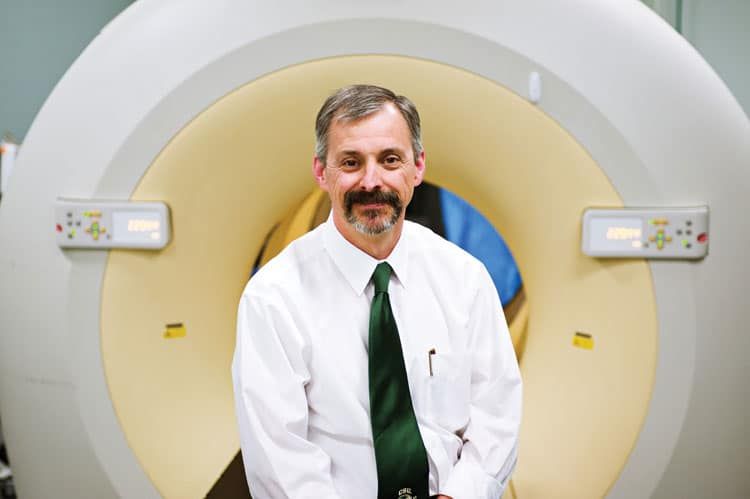Vet school in the field, right at home
2012 Bravo! Entrepreneur — Regional Spirit

CSU’s College of Veterinary Medicine and Biomedical Sciences has an enviable international reputation for its teaching college, research efforts and laboratories, yet some of the institution’s biggest beneficiaries are the ranchers, farmers, livestock breeders and everyday pet owners who work and live in Northern Colorado.
“You bring all of these people who have this high level of expertise and you tie them up all together in our area,” said Dean Hendrickson, director of the college’s veterinary teaching hospital. When an institution does that, he said, it can’t help but pay dividends for the locals who depend upon animals for their livelihood.
For example, dairy farmers and horse enthusiasts, breeders and trainers benefit from the teaching hospital’s dairy and equine field services programs, Hendrickson said. The field services teams are led by a faculty member veterinarian who works with a recent graduate veterinarian and a team of students.
Dairy farmers are prevalent in the Northern Colorado region, and those farmers have a huge investment in their livestock. “These cows are high performers and need lots of help,” Hendrickson said – help the college can provide through its field services. Teams go to the dairy farms to provide assistance with reproduction, disease and nutrition issues, he said. The goal is the “highest level of health that is possible,” Hendrickson said. Field services staff help farmers identify and control any emerging disease problems and offer nutritional advice that keep the cows producing lots of milk.
In the case of equine services, the college provides help with both the backyard pony and the high-value thoroughbred racing horse, Hendrickson said. As with its dairy services, the goal is to take the college’s expertise directly to the ranch. Those services can range from help with general health problems that don’t require surgery, which is a huge plus given the cost and effort of transporting a horse to a clinic, to dealing with breeding issues. Though not part of equine field services, the school also offers horse breeder services through its Equine Reproduction Laboratory, which has been an international leader since its founding in 1967.
The college also offers an equine sports medicine program for high-level performance horses and an Orthopaedic Research Center, Hendrickson said. These programs are popular with Northern Colorado’s concentration of horse trainers and breeders, many of whom are clustered within a 60-mile radius of Fort Collins, he said. The orthopaedic center focuses on the bio-mechanics of how a horse’s legs work during training with an aim toward preventing injuries. It also does research into various types of implants used to correct problems.
The equine sports medicine program, Hendrickson said, is an example of the college responding to a direct community need. The program was launched last July when horse owners began pressuring the college to provide the services.
The college’s integrated livestock management program is yet another example of how the institution and local farmers and ranchers help each other. Students enrolled in the program work on specific problems facing industry, such as neonatal calf survival, a critical issue for dairy and feedlot cattle. In this case, the researchers created manuals and a training course for professionals in the field.
But it’s not just the specialty services that provide a payoff for locals, Hendrickson said. The college provides a full range of everyday and emergency services for animals of all types, from the prize-winning bull to the family dog. Of course, there are plenty of options for the family dog, but it is much more difficult to find state-of-the-art emergency services for that bull.
The veterinary college and university also play an important economic development role in Northern Colorado, Hendrickson said. Because of its reputation, some of the world’s most-innovative animal health research happens at places such as the college’s Animal Cancer Center. In turn, innovative research techniques and findings get turned into spin-off businesses such as VetDC. VetDC uses the Animal Cancer Center’s vast research capacities and already close connections with major players in the biotech and biopharma industries to quickly identify promising cancer therapies for animals.
Hendrickson said another promising spin off, Advanced Regeneration Therapies, came from the Orthopaedic Research Center. The business provides stem cells derived from animal bone marrow to veterinarians. Stem cell therapy is useful in treating joint, tendon and ligament injuries.
And finally, there’s the household pets. The teaching hospital provides high-level care and access to the newest techniques and research for pets brought to its facilities.
“We think we’ve got a lot to offer the area by providing the best care possible,” Hendrickson said.
That’s the benefit of having an institution with a global reach and reputation just a short trip from the dairy, ranch, stable or home.
CSU’s College of Veterinary Medicine and Biomedical Sciences has an enviable international reputation for its teaching college, research efforts and laboratories, yet some of the institution’s biggest beneficiaries are the ranchers, farmers, livestock breeders and everyday pet owners who work and live in Northern Colorado.
“You bring all of these people who have this high level of expertise and you tie them up all together in our area,” said Dean Hendrickson, director of the college’s veterinary teaching hospital. When an institution does that, he said, it can’t help but pay dividends for the locals who depend upon animals for their livelihood.
For…
